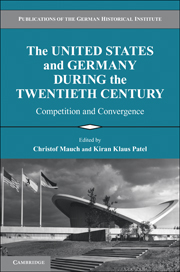Book contents
- Frontmatter
- Contents
- Contributors
- Acknowledgments
- 1 Modernities: Competition versus Convergence
- 2 Empires: Might and Myopia
- 3 Religion: Belief and Power
- 4 Law: Constitutionalism and Culture
- 5 Welfare: Entitlement and Exclusion
- 6 Immigration: Myth versus Struggles
- 7 Masses: Mobilization versus Manipulation
- 8 Market: Consumption and Commerce
- 9 Authority: Schools and Military
- 10 Gender: Equality and Differences
- 11 Environment: Conservation versus Exploitation
- 12 Film and Television
- 13 Education: Universities and Research
- 14 Media: Government versus Market
- Index
11 - Environment: Conservation versus Exploitation
Published online by Cambridge University Press: 12 October 2018
- Frontmatter
- Contents
- Contributors
- Acknowledgments
- 1 Modernities: Competition versus Convergence
- 2 Empires: Might and Myopia
- 3 Religion: Belief and Power
- 4 Law: Constitutionalism and Culture
- 5 Welfare: Entitlement and Exclusion
- 6 Immigration: Myth versus Struggles
- 7 Masses: Mobilization versus Manipulation
- 8 Market: Consumption and Commerce
- 9 Authority: Schools and Military
- 10 Gender: Equality and Differences
- 11 Environment: Conservation versus Exploitation
- 12 Film and Television
- 13 Education: Universities and Research
- 14 Media: Government versus Market
- Index
Summary
On the one side of the Atlantic, an almost endless territorial expanse and a state that stretches across a continent, encompassing all kinds of climactic zones; on the other, dense settlement in a single temperate zone. Here, there are urban landscapes and settlements without a center; over there are cities and villages whose history can often be read, like peeling an onion, back to the Middle Ages or even to classical antiquity: in almost no respect do the United States and Germany seem to differ as profoundly as in their respective patterns of settlement and in their treatment of the natural environment. At present, the United States is responsible for about one-quarter of global carbon dioxide emissions, whereas according to many rankings, Germany is one of the most successful of the leading industrialized countries in the field of climate protection. Nowhere in the world is there as much packaging and garbage as in the United States; in Germany, by contrast, an environmental consciousness receives significant support from state institutions and environmental political parties. Historically, Germans may have drawn repeatedly from the practices and ideas of the American environmental movement, but at first glance, it is the differences between Germany and America that are the most visible.
SURPLUS AND UNIFORMITY
“In the beginning all the world was America,” wrote John Locke in his 1690 Second Treatise of Government, using America as a metaphor both for the state of nature and for a distant and isolated continent. Because European colonists perceived the New World's indigenous people also to be a part of nature, the American territory appeared empty and endless to them. They defined it as a vacuum domicilium and legally as a “wasteland.” In the cultivation of a “wilderness” that in reality had been the Native Americans’ hunting and farming grounds, the white settlers saw a project given to them by God. The early settlers saw this task as nearly unachievable and, particularly in the early colonial days, their main occupation was the struggle for simple survival. Entire generations imagined the continent to be limitless. Thomas Jefferson, for instance, believed the settlement of America would take a hundred generations. In the end, however, it took only five. Never in history were such vast amounts of land populated by immigrants at such a quick pace.
- Type
- Chapter
- Information
- The United States and Germany during the Twentieth Centurycompetition and convergence, pp. 180 - 193Publisher: Cambridge University PressPrint publication year: 2010
- 2
- Cited by



